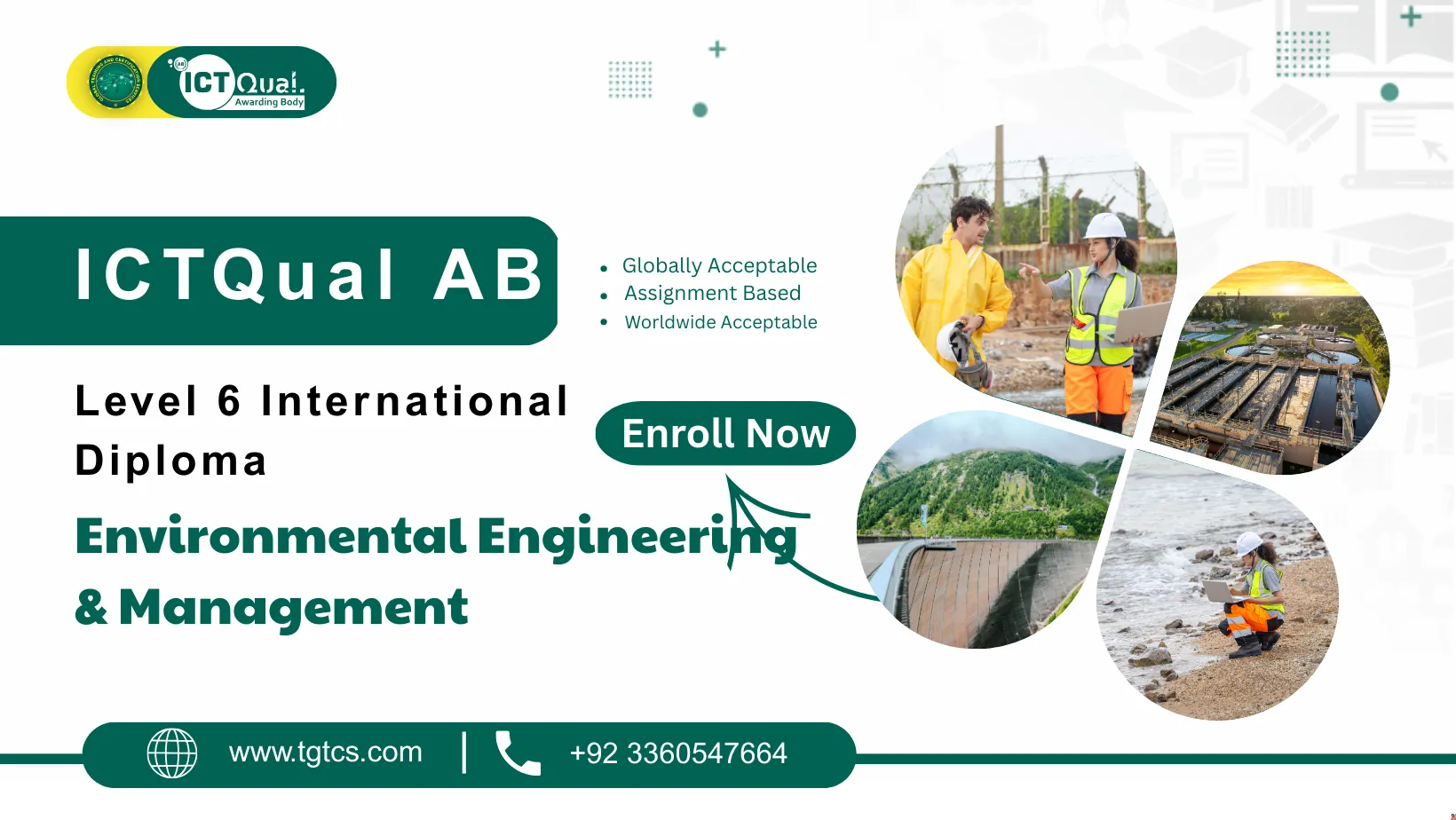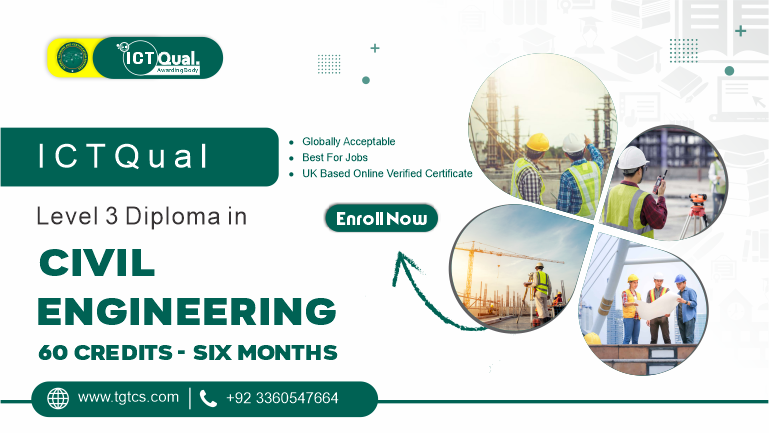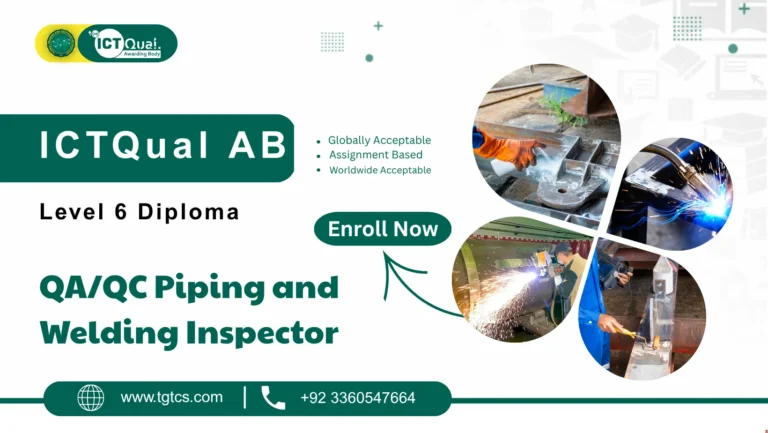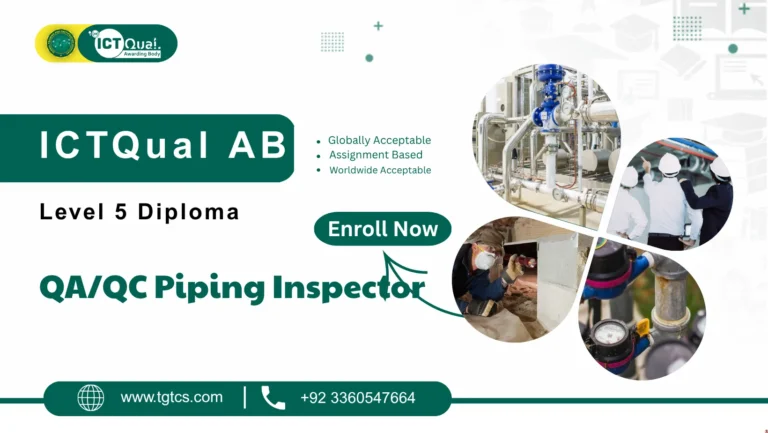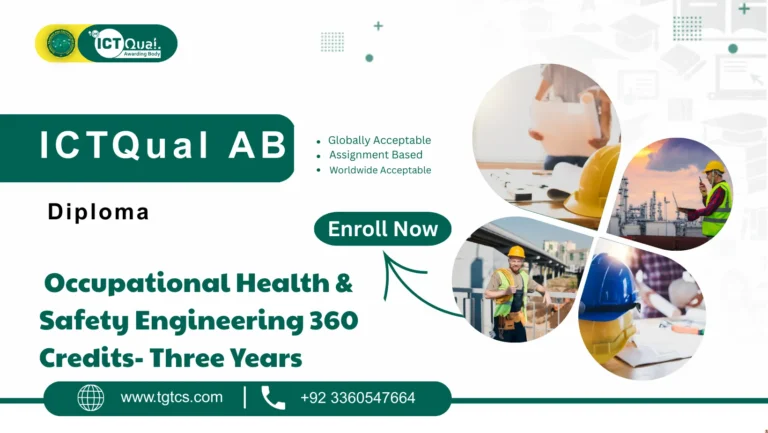ICTQual AB Level 6 International Diploma in Environmental Engineering & Management
The ICTQual AB Level 6 International Diploma in Environmental Engineering & Management is a globally recognized qualification designed to equip professionals with advanced knowledge and practical expertise in environmental sustainability, engineering solutions, and regulatory compliance. In today’s rapidly evolving industrial and urban landscapes, the demand for skilled environmental engineers and managers has never been greater. This course emphasizes innovative approaches to environmental protection, resource management, and sustainable development, making it essential for professionals aiming to lead in environmental engineering and management roles.
The diploma provides comprehensive coverage of environmental engineering principles, environmental impact assessment, waste management, water and air quality control, and sustainable industrial practices. Learners will gain practical skills in designing and implementing environmentally responsible solutions, conducting environmental audits, and managing projects that comply with international environmental standards and regulations. The course also fosters strategic thinking, risk assessment, and problem-solving abilities, enabling graduates to address complex environmental challenges in diverse sectors including construction, manufacturing, energy, and municipal planning.
Through this Level 6 diploma, learners will acquire expertise in environmental management systems, pollution control technologies, sustainability strategies, and leadership in environmental initiatives. The program is fully assignment-based, allowing flexibility for working professionals and learners from around the world to study at their own pace. British Council verifiable, MOFA and Embassy attested, and recognized for employment and iqama approval, this diploma ensures global credibility and enhances career opportunities in environmental engineering, consultancy, project management, and sustainability leadership.
The Global Training and Certification Services is Approved Training Centre of ICTQual AB UK Ltd
Course Level and Credits
Level 6 International Diploma, 360 credits.
Suitable for professionals, environmental engineers, managers, and students seeking advanced knowledge in environmental engineering and sustainability management.
Mode of Study
Fully assignment-based; learn at your own pace.
Accessible from anywhere in the world, flexible for working professionals.
Global Recognition & Attestation
British Council verifiable, MOFA and Embassy attested.
Recognized for career advancement, employment, and iqama approval in Gulf countries.
Scope and Purpose
Comprehensive coverage of environmental engineering, sustainability practices, pollution control, and environmental management systems.
Focus on both theoretical understanding and practical application in real-world environmental and industrial scenarios.
Skills and Knowledge Gained
Environmental impact assessment, pollution monitoring, waste and water management, and sustainability strategies.
Leadership, project management, and strategic decision-making skills in environmental engineering projects.
Career Benefits
Opens opportunities in environmental consultancy, sustainability management, industrial compliance, project management, and public sector environmental planning.
Enhances professional credibility and employability in international and industrial environmental sectors.
Target Audience
Professionals, engineers, project managers, environmental consultants, and students aiming for careers in environmental engineering and management.
Unique Selling Points (USPs)
Flexible self-paced study, fully assignment-based.
Prestigious and globally recognized Level 6 diploma.
Ideal for international job opportunities and iqama approval.
Mandatory Unit
This qualification, the ICTQual AB Level 6 International Diploma in Environmental Engineering & Management, consists of 36 mandatory units.
Year 1 – Foundation of Environmental Engineering & Management
- Principles of Environmental Engineering
- Introduction to Environmental Science and Sustainability
- Environmental Legislation and Regulatory Compliance
- Environmental Impact Assessment (EIA) Fundamentals
- Waste Management and Pollution Control
- Water Quality Management and Treatment
- Air Quality Monitoring and Control
- Soil and Groundwater Protection
- Renewable Energy Systems and Applications
- Occupational Health, Safety, and Environmental Awareness
- Communication and Reporting in Environmental Management
- Professional Ethics and Responsibility in Environmental Practice
Year 2 – Applied Environmental Engineering & Management
- Advanced Environmental Risk Assessment
- Industrial Wastewater and Effluent Management
- Solid and Hazardous Waste Engineering
- Environmental Monitoring and Audit Techniques
- Sustainable Resource Management and Conservation
- Climate Change Mitigation and Adaptation Strategies
- Environmental Modelling and Data Analysis
- Green Building and Sustainable Infrastructure
- Environmental Management in Manufacturing and Energy Sectors
- Behavioural and Organisational Approaches to Environmental Safety
- Digital Tools and Technologies in Environmental Engineering
- Research Methods and Environmental Project Planning
Year 3 – Strategic Environmental Leadership & Management
- Strategic Environmental Management and Governance
- Integrated Environmental Management Systems (ISO 14001, ISO 50001)
- Environmental Policy Development and Implementation
- Sustainability Leadership and Corporate Social Responsibility (CSR)
- Environmental Risk Management in Large-Scale Projects
- Renewable Energy Project Management
- International Environmental Standards and Best Practices
- Environmental Innovation and Emerging Technologies
- Environmental Crisis Management and Emergency Planning
- Advanced Occupational Health & Environmental Wellbeing Strategies
- Independent Research Project in Environmental Engineering
- Capstone Project: Applied Environmental Engineering & Management
Start your journey toward becoming a global expert in environmental engineering and management with this comprehensive Level 6 diploma.
Year 1 – Foundation of Environmental Engineering & Management
1. Principles of Environmental Engineering
- Understand foundational principles of environmental engineering and sustainability.
- Analyze environmental challenges and design practical engineering solutions.
- Apply problem-solving methods for real-world environmental scenarios.
- Explore sustainable practices in industrial and municipal contexts.
2. Introduction to Environmental Science and Sustainability
- Gain knowledge of ecosystems, biodiversity, and environmental processes.
- Understand sustainable development concepts and global environmental challenges.
- Evaluate environmental impacts and develop sustainability strategies.
- Explore social, economic, and ethical aspects of environmental decisions.
3. Environmental Legislation and Regulatory Compliance
- Understand local and international environmental laws and policies.
- Learn techniques for regulatory compliance in industrial operations.
- Develop skills to implement environmental governance frameworks.
- Identify legal responsibilities and reporting requirements for organizations.
4. Environmental Impact Assessment (EIA) Fundamentals
- Conduct comprehensive environmental impact assessments.
- Identify potential risks and mitigation strategies for projects.
- Engage stakeholders in environmental evaluation and reporting.
- Analyze project impacts on ecosystems, communities, and resources.
5. Waste Management and Pollution Control
- Learn methods for solid, liquid, and hazardous waste management.
- Develop pollution control strategies for industrial and municipal projects.
- Design environmentally sustainable waste treatment systems.
- Understand principles of resource recovery and circular economy.
6. Water Quality Management and Treatment
- Monitor and improve water quality in industrial and municipal systems.
- Apply treatment techniques for wastewater and potable water.
- Analyze sources of water pollution and design mitigation measures.
- Promote sustainable water resource management practices.
7. Air Quality Monitoring and Control
- Measure and manage air pollutants in industrial and urban environments.
- Identify emission sources and evaluate environmental impacts.
- Apply air quality standards and mitigation strategies.
- Develop reporting and compliance procedures for air monitoring.
8. Soil and Groundwater Protection
- Understand soil contamination and groundwater pollution risks.
- Apply remediation techniques for contaminated sites.
- Design strategies to protect soil and water resources.
- Develop monitoring and conservation practices for natural resources.
9. Renewable Energy Systems and Applications
- Explore solar, wind, hydro, and biomass energy systems.
- Integrate renewable energy solutions in industrial and municipal projects.
- Assess sustainability and economic feasibility of renewable technologies.
- Implement clean energy practices to reduce environmental impact.
10. Occupational Health, Safety, and Environmental Awareness
- Identify workplace health and safety hazards in environmental projects.
- Develop strategies for environmental risk assessment and mitigation.
- Understand compliance with occupational safety and environmental regulations.
- Promote safe and sustainable work practices.
11. Communication and Reporting in Environmental Management
- Develop technical writing and presentation skills for environmental projects.
- Communicate environmental information effectively to stakeholders.
- Produce compliant and professional environmental reports.
- Apply data visualization and documentation techniques for clarity.
12. Professional Ethics and Responsibility in Environmental Practice
- Understand ethical principles in environmental engineering and management.
- Take accountability for environmental decision-making and sustainability.
- Promote ethical and responsible practices in industrial projects.
- Apply professional standards and codes of conduct in environmental work.
Year 2 – Applied Environmental Engineering & Management
13. Advanced Environmental Risk Assessment
- Conduct advanced environmental risk evaluations in industrial contexts.
- Implement hazard identification and mitigation strategies.
- Use predictive tools to manage environmental risks.
- Develop contingency and emergency response plans.
14. Industrial Wastewater and Effluent Management
- Design systems for industrial wastewater treatment and effluent control.
- Monitor water quality and ensure regulatory compliance.
- Apply innovative techniques for waste minimization.
- Integrate sustainable practices in industrial water management.
15. Solid and Hazardous Waste Engineering
- Manage solid and hazardous wastes safely and sustainably.
- Design treatment, storage, and disposal systems for hazardous materials.
- Assess environmental impact of waste management processes.
- Implement recycling and resource recovery strategies.
16. Environmental Monitoring and Audit Techniques
- Conduct environmental audits and monitoring in industrial projects.
- Collect, analyze, and interpret environmental data.
- Ensure compliance with international standards and regulations.
- Report findings and recommend corrective actions.
17. Sustainable Resource Management and Conservation
- Develop strategies for efficient resource utilization and conservation.
- Promote circular economy practices in industrial operations.
- Assess environmental impact of resource extraction and usage.
- Implement sustainability initiatives across projects.
18. Climate Change Mitigation and Adaptation Strategies
- Understand global climate change challenges and risks.
- Design mitigation strategies to reduce greenhouse gas emissions.
- Develop adaptation plans for climate resilience.
- Apply sustainable solutions in energy, water, and waste management.
19. Environmental Modelling and Data Analysis
- Use modelling tools to simulate environmental processes and impacts.
- Analyze environmental datasets for decision-making.
- Apply predictive analytics for risk management and sustainability planning.
- Develop data-driven environmental strategies.
20. Green Building and Sustainable Infrastructure
- Design energy-efficient and environmentally friendly buildings.
- Implement sustainable materials and construction practices.
- Monitor environmental performance in infrastructure projects.
- Promote LEED, BREEAM, and other green building standards.
21. Environmental Management in Manufacturing and Energy Sectors
- Apply environmental management systems in industrial operations.
- Develop pollution prevention and waste minimization plans.
- Integrate environmental sustainability into energy production.
- Evaluate environmental performance for continuous improvement.
22. Behavioural and Organisational Approaches to Environmental Safety
- Develop organizational safety culture for environmental projects.
- Promote employee engagement in sustainability initiatives.
- Apply behavioral safety strategies to reduce environmental risks.
- Assess the impact of human factors on environmental management.
23. Digital Tools and Technologies in Environmental Engineering
- Use digital technologies for environmental monitoring and management.
- Apply GIS, IoT, and simulation software in environmental projects.
- Develop smart solutions for sustainability and compliance.
- Analyze data and optimize environmental processes using technology.
24. Research Methods and Environmental Project Planning
- Conduct applied research in environmental engineering and management.
- Design, plan, and execute environmental projects.
- Develop critical thinking and analytical skills for decision-making.
- Prepare research reports and project documentation professionally.
Year 3 – Strategic Environmental Leadership & Management
25. Strategic Environmental Management and Governance
- Implement strategic planning for environmental sustainability.
- Develop governance frameworks for organizational environmental compliance.
- Monitor and evaluate environmental performance at strategic levels.
- Integrate sustainability goals into corporate policies.
26. Integrated Environmental Management Systems (ISO 14001, ISO 50001)
- Apply ISO standards for environmental and energy management systems.
- Design and implement integrated management practices.
- Conduct audits and maintain compliance with international frameworks.
- Promote continual improvement in environmental management systems.
27. Environmental Policy Development and Implementation
- Formulate policies aligned with sustainability and regulatory requirements.
- Develop strategies for effective policy implementation.
- Evaluate policy effectiveness and recommend improvements.
- Engage stakeholders in environmental policy development.
28. Sustainability Leadership and Corporate Social Responsibility (CSR)
- Lead organizational sustainability and CSR initiatives.
- Promote environmentally responsible business practices.
- Integrate sustainability into corporate strategy.
- Measure and report CSR impact on communities and environment.
29. Environmental Risk Management in Large-Scale Projects
- Identify, assess, and mitigate environmental risks in major projects.
- Apply advanced risk management tools and methodologies.
- Develop emergency response and contingency plans.
- Ensure compliance with environmental laws and best practices.
30. Renewable Energy Project Management
- Plan, implement, and manage renewable energy projects.
- Evaluate feasibility, sustainability, and environmental impact.
- Monitor performance and optimize project outcomes.
- Apply leadership skills for successful project delivery.
31. International Environmental Standards and Best Practices
- Understand global environmental regulations and compliance standards.
- Benchmark practices against international frameworks.
- Implement best practices in environmental management.
- Promote organizational excellence and sustainability.
32. Environmental Innovation and Emerging Technologies
- Explore new technologies for environmental monitoring and sustainability.
- Apply innovative solutions for pollution control and resource efficiency.
- Integrate digital and automated tools in environmental management.
- Promote continuous improvement and environmental innovation.
33. Environmental Crisis Management and Emergency Planning
- Develop strategies for handling environmental emergencies and crises.
- Conduct simulations and risk assessments for disaster preparedness.
- Coordinate response plans across teams and stakeholders.
- Evaluate effectiveness and improve emergency management protocols.
34. Advanced Occupational Health & Environmental Wellbeing Strategies
- Promote workplace health, safety, and environmental wellbeing.
- Integrate ergonomics, hygiene, and safety practices in projects.
- Develop programs for employee and community environmental awareness.
- Ensure compliance with health, safety, and environmental standards.
35. Independent Research Project in Environmental Engineering
- Conduct in-depth research on a specialized environmental topic.
- Apply advanced research methodologies and data analysis techniques.
- Present findings professionally with recommendations for implementation.
- Demonstrate critical thinking and innovation in environmental solutions.
36. Capstone Project: Applied Environmental Engineering & Management
- Apply knowledge and skills to a real-world environmental project.
- Integrate multidisciplinary concepts for sustainable outcomes.
- Demonstrate leadership, project management, and technical expertise.
- Showcase readiness for professional roles in environmental engineering and management.
Advance your career in environmental engineering and sustainability with the ICTQual AB Level 6 International Diploma in Environmental Engineering & Management. This globally recognized qualification equips learners with practical skills, technical expertise, and strategic knowledge to excel in the green and industrial sectors.
Enhanced Professional Expertise
- Gain advanced technical knowledge in environmental engineering, management, and sustainability.
- Develop practical skills for implementing innovative solutions in industrial, municipal, and energy sectors.
Career Advancement Opportunities
- Unlock roles in environmental consulting, project management, renewable energy, and corporate sustainability.
- Improve employability and professional credibility in international markets and regulatory environments.
Global Recognition and Compliance
- British Council verifiable, MOFA and Embassy attestable for international career recognition.
- Suitable for iqama approval and employment opportunities in Gulf countries.
Leadership and Strategic Skills
- Build expertise in environmental policy development, strategic planning, and risk management.
- Lead sustainability initiatives and CSR projects within organizations and communities.
Flexibility and Accessibility
- Fully assignment-based, self-paced learning accessible from anywhere in the world.
- Ideal for both fresh graduates and experienced professionals seeking upskilling in environmental management.
Take the first step toward becoming a globally competent environmental engineering professional with this comprehensive Level 6 diploma, designed to combine practical applications, regulatory knowledge, and leadership skills for sustainable impact.
Advance your professional journey with the ICTQual AB Level 6 International Diploma in Environmental Engineering & Management by identifying the ideal learners who can benefit most from this globally recognized qualification.
Environmental Engineering Graduates
- Gain practical and advanced knowledge to enhance technical competence in environmental management.
- Prepare for leadership roles in sustainability, waste management, and pollution control sectors.
Working Professionals in Industrial or Energy Sectors
- Enhance skills to implement sustainable practices and comply with environmental regulations.
- Lead environmental initiatives and contribute to corporate social responsibility (CSR) projects.
Sustainability and Renewable Energy Specialists
- Acquire knowledge of renewable energy systems, climate change mitigation, and green technologies.
- Develop strategies to optimize resource management and implement eco-friendly solutions.
Health, Safety, and Environmental (HSE) Professionals
- Learn to integrate occupational health, safety, and environmental practices into industrial operations.
- Improve risk assessment, compliance, and monitoring skills for safer workplaces.
Students Seeking International Career Opportunities
- Prepare for globally recognized qualifications that support employment and iqama approval in Gulf countries.
- Build leadership, strategic decision-making, and technical skills relevant to international environmental projects.
This diploma is ideal for ambitious learners aiming to excel in environmental engineering, sustainability, and industrial management, offering them the tools to make a tangible impact in the global green economy.
Course Overview
Course Level
Level 6
Course Units
36 Units
Credits
360
Duration
3 years
